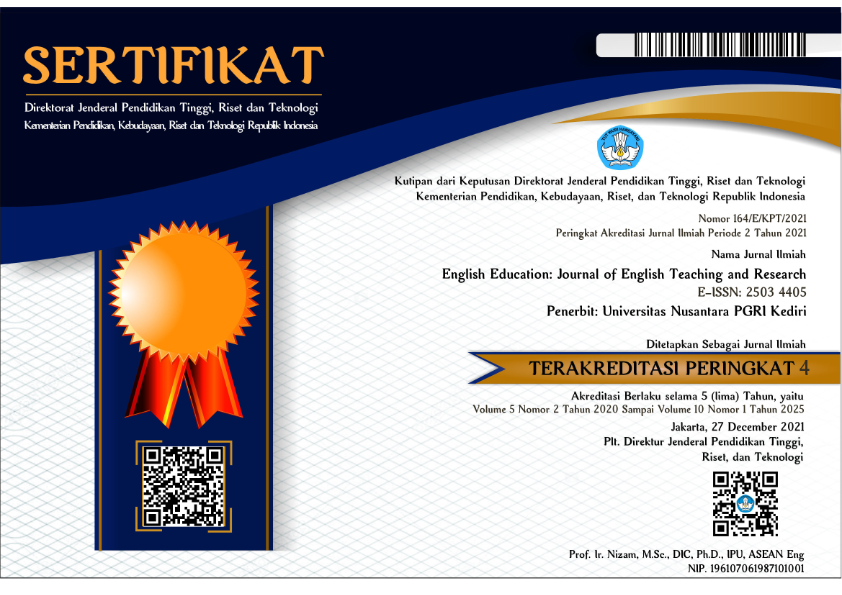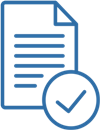The Impact of Teacher’s Feedback on Students’ Writing Ability
DOI:
https://doi.org/10.29407/jetar.v9i1.21669Keywords:
teacher feedback; essay; writingAbstract
Teacher feedback on students' essay writing is often an alternative for teachers to support the improvement of students' writing quality. This study has the main objective to find out the relationship between teacher’s feedback and student essay writing by looking at the difference in student essay scores before and after feedback. Methodology used in this research is descriptive quantitative by looking at the data of students' project scores in one class. The results showed that there was a good improvement in students' ability to write essays, this was shown through the average student score which had a significant difference between before and after being given feedback from the lecturer. The conclusion obtained through this research is that feedback from teachers is effective in improving the quality of student writing, especially in this research essay writing.
Downloads
References
Brace, I. (2018). Questionnaire Design: fourth edition. Great Britain and the United States.
Bradley Irwin. (2017). Written Corrective Feedback: Student Preferences and Teacher Feedback Practices. IAFOR Journal of Language Learning, 3(2), 35-58.
Cao, S., Zhou, S., Luo, Y., Wang, T., Zhou, T., & Xu, Y. (2022). A review of the ESL/EFL learners’ gains from online peer feedback on English writing. Frontiers in Psychology, 13, 1035803. https://doi.org/10.3389/fpsyg.2022.1035803
Chen, Jialiang. (2021). Research on the Effect of Peer Feedback Training in English Writing Teaching - A Case Study of Students in Business English Major. Canadian Center of Science and Education, 14(6), 12-24. https://eric.ed.gov/?id=EJ1302597
Darvishi, A., Khosravi, H., Abdi, S., Sadiq, S., & Gašević, D. (2021). Incorporating Training, Self-monitoring and AI-Assistance to Improve Peer Feedback Quality. The University of Queensland. Brisbane, QLD, Australia. https://doi.org/10.1145/3491140.3528265
Deliang Man, Meng Huat Chau & Beibei Kong (2021) Promoting student engagement with teacher feedback through rebuttal writing. Educational Psychology, 41:7, 883-901, DOI: 10.1080/01443410.2020.1746238
Gaynor, J. W. (2020). Peer review in the classroom: student perceptions, peer feedback quality and the role of assessment. Assessment & Evaluation in Higher Education, 45:5, 758-775, DOI: 10.1080/02602938.2019.1697424
Heerden, M. V., Bharuthram, S. (2021). Knowing me, knowing you: the effects of peer familiarity on receiving peer feedback for undergraduate student writers. Assessment & Evaluation in Higher Education, 46:8, 1191-1201, DOI: 10.1080/02602938.2020.1863910
Hennink, M., Hutter, I. & Bailey, A. (2020). Qualitative Research Methods. Sage Publications.
Huisman, B., Saab, N., Broek, P. V. D., Driel J. V. (2019). The impact of formative peer feedback on higher education students’ academic writing: a Meta-Analysis. Assessment & Evaluation in Higher Education, 44:6, 863-880, DOI: 10.1080/02602938.2018.1545896
Hyland, K., & Hyland, F. (2019). Feedback In Second Language Writing: Context and Issue. Cambridge: Cambridge University Press. ISBN 978-1-108-42507-0, ISBN 978-1-108-43997-8
Kelly Tee Pei Leng. (2014). An Analysis of Written Feedback on ESL Students’ Writing. Elsevier Ltd, 389-397. DOI: 10.1016/j.sbspro.2014.01.1437
Latifi, S., Noroozi, O., Hatami, J., & Biemans, H. J. (2021). How does online peer feedback improve argumentative essay writing and learning? Innovations in Education and Teaching International, 58(2), 195-206. doi:10.1080/14703297.2019.1687005.
Lee, I. (2017). Classroom writing assessment and feedback in L2 school contexts. Singapore: Springer.
Lerchenfeldt, S., Mi, M., & Eng, M. (2019). The utilization of peer feedback during collaborative learning in undergraduate medical education: a systematic review. BMC Medical Education, 19(1), 36. doi: 10.1186/s12909-019-1462-7.
Oermann, M. H., & Hays, J. C. (2016). Writing for Publication in Nursing. New York: Springer Publishing Company. ISBN 978-0-8261-1991-9, ISBN 978-0-8261-1992-6
Ogden, W. R. (2013). Reaching All the Students: The Feedback Lecture. Journal of Instructional Psychology, (22).
Patten, M. L. (2017). Questionnaire Research. Routledge.
Razali, R. & Jupri, R. (2014). Exploring Teacher Written Feedback and Student Revisions on ESL Students’ Writing. OSR Journal Of Humanities And Social Science (IOSR-JHSS), 19(5), 63-70. www.iosrjournals.org
Redman, P., & Maples, W. (2017). Good Essay Writing: A Social Sciences Guide. London: Sage Publication Inc. ISBN 978-1-4379-8217-8, ISBN 978-1-4379-8216-1(pbk)
Reinholz, D. L. (2015). Peer-Assisted Reflection: A design-based intervention for improving success in calculus. International Journal of Research in Undergraduate Mathematics Education, 1(2), 234–267. https://doi.org/10.1007/s40753-015-0005-y
Shutao, W. & Demei, Z. (2020). Perceived teacher feedback and academic performance: the mediating effect of learning engagement and moderating effect of assessment characteristics. Assessment & Evaluation in Higher Education, 45(7), 973-987.
Success in Academic Writing. London: Bloomsbury Academic. ISBN 978-1-3503-5285-8, ISBN 978-1-3503-5287-2 (eBook)
Taherdoost, H. (2022). Designing a Questionnaire for a Research Paper: A Comprehensive Guide to Design and Develop an Effective Questionnaire. Asian Journal of Managerial Science, 11(1), 8-16. https://doi.org/10.51983/ajms-2022.11.1.3087
Toronto, C. E., & Remington, R. (Eds.). (2020). A Step-by-Step Guide to Conducting an Integrative Review. Switzerland: Springer Nature Switzerland AG. doi: https://doi.org/10.1007/978-3-030-37504-1. ISBN 978-3-030-37503-4, ISBN 978-3-030-37504-1 (eBook).
Trang, N. H. & Anh, H, K. (2022). Effect of Peer Feedback on Paragraph Writing Performance among High School Students. International Journal of Instruction, 15 (2), 189-206 .
Ula, E. N., Umamah, A. (2022). Using Online Peer Review As a Strategy to Improve Writing Skills. International Journal of Indonesian Education and Teaching, 6(1).
Uymaz, E. (2019). The effects of peer feedback on the essay writing performances of EFL students. International Journal of Curriculum and Instruction, 11(2), 20–37.
Warburton, N. (2007). The Basics of Essay Writing (1st ed.). Routledge. https://doi.org/10.4324/9780203947066
Watling, C., Shaw, J., Field, E., Ginsburg, S. (2022). ‘For the most part it works’: Exploring how authors navigate peer review feedback. Medical Education, 57(2), 151-160. https://doi.org/10.1111/medu.14932.
Weng, F., Ye, S.X. & Xue, W. (2023). The Effects of Peer Feedback on L2 Students’ Writing Motivation: An Experimental Study in China. Asia-Pacific Edu Res, 32, 473–483. https://doi.org/10.1007/s40299-022-00669-y
Yalch, M. M., Vitale, E. M. & Ford, J. K. (2019). Benefits of Peer Review on Students’ Writing. Psychology Learning & Teaching, 18(3), 317–325.
Yasmin, F. A., Anggini, N. & Siahaan, R. P. (2023). Peer Review in Improving Students’ Perception Argumentative Essay: The Effectives from Students’ Perceptive. Jurnal Edukasi Nonformal, 4(1).
Zarraonandia, T., Aedo, I., Díaz, P., & Montero, A. (2013). An augmented lecture feedback system to support learner and teacher communication. British Journal of Educational Technology, 44(4), 616-628. Doi: 10.1111/bjet.12047.
Zhang, F., Schunn, C. D. & Baikadi, A. (2017). Charting the routes to revision: An interplay of writing goals, peer comments, and self-reflections from peer reviews. Springer Science Business Media B.V.
Zong, Z. Schunn, C. D., Wang, Y. (2021) Learning to improve the quality peer feedback through experience with peer feedback. Assessment & Evaluation in Higher Education, 46:6, 973-992. DOI: 10.1080/02602938.2020.1833179
Downloads
Published
Issue
Section
License
Copyright (c) 2024 Dina Renata, Dini Renati, Nurul Hidayah, Lilia Indriani

This work is licensed under a Creative Commons Attribution-ShareAlike 4.0 International License.
Authors who publish with this journal agree to the following terms:
- Copyright on any article is retained by the author(s).
- The author grants the journal, the right of first publication with the work simultaneously licensed under a Creative Commons Attribution License that allows others to share the work with an acknowledgment of the work’s authorship and initial publication in this journal.
- Authors are able to enter into separate, additional contractual arrangements for the non-exclusive distribution of the journal’s published version of the work (e.g., post it to an institutional repository or publish it in a book), with an acknowledgment of its initial publication in this journal.
- Authors are permitted and encouraged to post their work online (e.g., in institutional repositories or on their website) prior to and during the submission process, as it can lead to productive exchanges, as well as earlier and greater citation of published work.
- The article and any associated published material is distributed under the Creative Commons Attribution-ShareAlike 4.0 International License








 Article template
Article template



